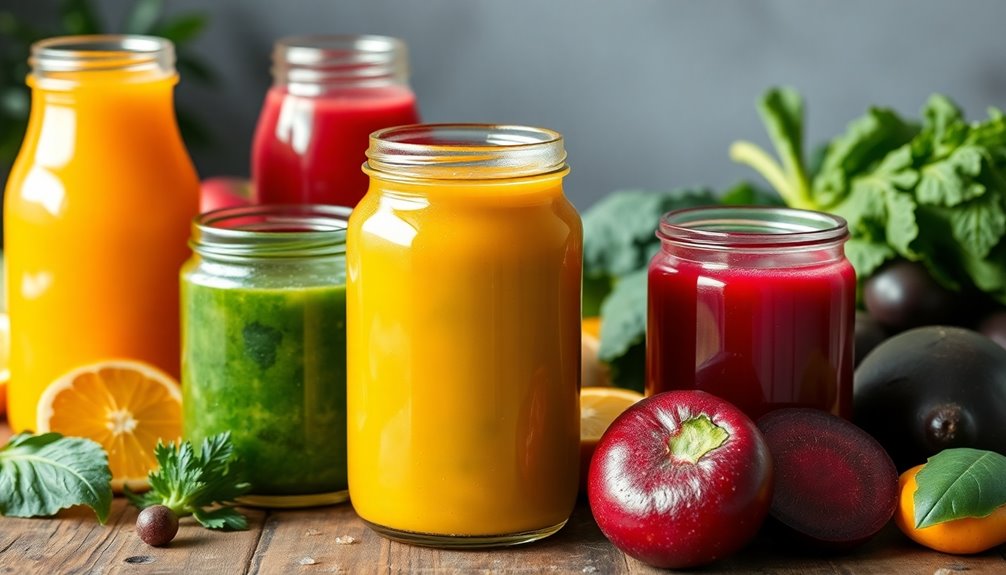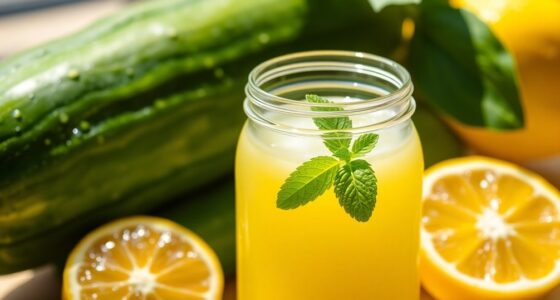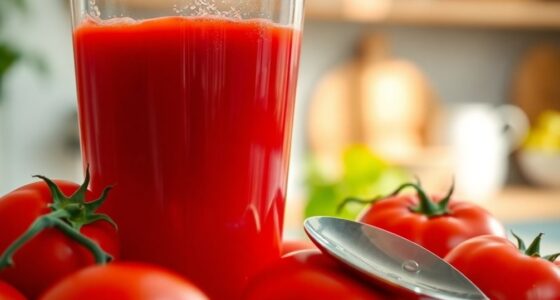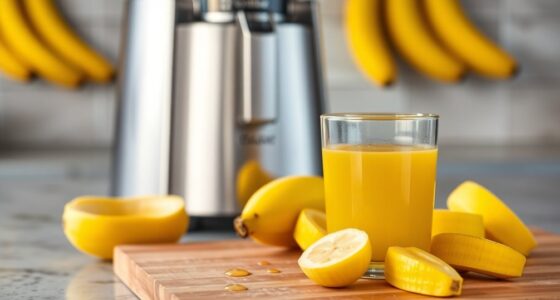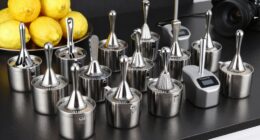Juice lasts different amounts of time after juicing, and it mostly depends on the juicer type you use. If you use a centrifugal juicer, your juice will be good for about 24 hours. Masticating juicers keep juice fresh for 48 to 72 hours, while twin-gear juicers can last 4 to 5 days. Proper storage is key too, so use airtight containers and refrigerate your juice. Learn more about how to keep your juice fresh for longer!
Key Takeaways
- Juice from a centrifugal juicer lasts up to 24 hours due to higher oxidation rates.
- Masticating juicer juice remains fresh for 48 to 72 hours, preserving more nutrients.
- Twin-gear juicer juice can last 4 to 5 days, offering the longest freshness.
- Incorporating acidic fruits like citrus can extend juice longevity due to their natural preserving properties.
- Proper storage in airtight containers and refrigeration is essential for maximizing juice freshness.

When you juice fresh fruits and vegetables, you might wonder how long that vibrant drink will last before it loses its quality. The answer isn't straightforward, as it largely depends on the type of juicer you use and how you store the juice afterward.
If you're using a centrifugal juicer, you should know that the juice typically lasts only up to 24 hours. This is primarily due to the higher oxidation rates associated with this method, which introduces more air into the juice, leading to quicker degradation of flavor and nutrients.
On the other hand, if you opt for a masticating juicer, you can enjoy your fresh juice for a longer period—usually between 48 to 72 hours. Masticating juicers operate at a slower speed, which minimizes the oxidation process and helps preserve the nutrient content.
If you want to extend the shelf life even further, consider using a twin-gear juicer. This type of juicer can produce juice that remains fresh for an impressive 4 to 5 days. The dual gears create a more efficient extraction process, resulting in less oxidation and better retention of vitamins and minerals.
The type of produce you use also plays a crucial role in how long your juice stays fresh. Highly acidic fruits, such as citrus fruits, are particularly beneficial. Their natural preservatives can help extend the freshness of your juice, allowing you to enjoy that zesty flavor for a bit longer.
So, if you're planning to make a batch of juice, don't shy away from adding some oranges or lemons to the mix.
Proper storage techniques are essential if you want to maximize the shelf life of your fresh juice. Always store your juice in airtight containers. Filling these containers to the brim minimizes the air exposure, which helps reduce oxidation.
Once you’ve got your juice sealed up, refrigeration is a must. Keeping your juice chilled at temperatures between 35-40°F (1. 6-4. 4°C) will significantly enhance its longevity. If you’re considering extending its shelf life further, you might also want to explore freezing your juice. However, it’s important to note that freezing can alter the taste and texture, so be mindful of how long does juice freeze when storing it. For optimal quality, aim to consume your refrigerated juice within a week, or freeze it for later enjoyment while ensuring you leave enough space in the container for expansion.
If you've made a large batch of fresh juice, it's a good idea to consume it within the first couple of days for optimal taste and nutrient content. As days go by, even if the juice appears fine, the flavors might start to dull, and the nutrients may degrade.
Always listen to your senses; if the juice smells off or tastes different, it's best to discard it.
Frequently Asked Questions
How Long Can Juice Last After Juicing?
When you juice, the freshness of your drink can vary significantly.
If you've used a centrifugal juicer, expect your juice to last about 24 hours. Masticating juicers can extend that to around 48 hours.
For optimal longevity, consider a twin-gear juicer, which can keep your juice fresh for 4 to 5 days.
Always store your juice in airtight glass containers and refrigerate it at the right temperature to maximize its shelf life.
Do You Have to Drink Juice Immediately After Juicing?
You don't have to drink juice immediately after juicing, but it's best if you do.
Fresh juice tastes great and offers maximum nutrients right away. If you need to save it, store it in an airtight glass container in the fridge to maintain freshness.
Just remember, the longer you wait, the more nutrients you lose. If you add lemon juice, it can help keep it fresh a bit longer!
Can I Drink Pressed Juice After 3 Days?
Did you know that cold-pressed juices can sometimes last up to five days?
However, if you're considering drinking pressed juice after three days, it's crucial to check for signs of spoilage. While it might still be safe, the taste and nutritional value will likely have diminished significantly.
Always store your juice in an airtight glass container and keep it refrigerated at 35-40°F to maximize freshness and reduce the risk of spoilage.
Can You Drink Juice After 7 Days?
You shouldn't drink juice after 7 days.
Even if it's been stored properly, the risk of spoilage and nutrient loss increases significantly.
If the juice has an off-taste or strong odor, it's definitely a sign to avoid it.
For the best flavor and health benefits, aim to consume your juice within 3 days.
Staying mindful of these factors helps you enjoy fresh juice safely without compromising your health.
Conclusion
So, there you have it! Your freshly juiced concoction might last longer than your New Year's resolution but not by much. If you want that vibrant flavor and nutrient punch, drink it within 24 to 72 hours. Otherwise, you might as well be sipping on a science experiment! Remember, even juice deserves a good life, so treat it well and consume it quickly—after all, it doesn't want to end up in the fridge's forgotten corner, plotting its revenge!
Cindy thoroughly researches juicing trends, techniques, and recipes to provide readers with practical advice and inspiration. Her writing style is accessible, engaging, and designed to make complex concepts easy to understand. Cindy’s dedication to promoting the advantages of juicing shines through her work, empowering readers to make positive changes in their lives through the simple act of juicing.

